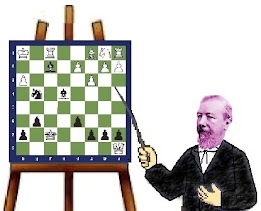The last post looked at Anastasia's mate. In this one we will take a look at another mate...Blackburne's mate which involves two Bishops and a Knight against a castled King.
It's named after Joseph H. Blackburne, a British player who once demonstrated it in one of his games.
The following game is a modern version that was played in the 1962 New Zealand Championship.
Ortvin Sarapu (1924-1999) was born in Narva, Estonia, learned to play at age 8 and by age 11 he could play four blindfold games simultaneously.
In 1940 he won the Estonian Junior Championship, but then the Second World War disrupted his life.
In 1943 he made his way via Finland to Sweden where he was held in captivity for the rest of the war.
During a tournament at Oldenburg, Germany in 1949 he met New Zealander Robert Wade, which led to his emigration to New Zealand in 1950. Sarapu won or co-won the New Zealand Championship 20 times!
His opponent was Zygmunt Frankel (1921-2001) who was born in Krakow, Poland. He and his Jewish parents escaped the Holocaust by fleeing to the Soviet Union, initially in Siberia and then via the Urals and Soviet Asia.
In 1949 he emigrated to New Zealand and became active in administration in the New Zealand Chess scene. Frankel played in a number of New Zealand Championships and on two different occasions he was the editor of the New Zealand Chess Magazine. He passed away in Wellington after a brief illness.
[Event "New Zealand Champ, Wellington"]
[Site "Wellington NZL"]
[Date "1962.??.??"]
[Round "?"]
[White "Ortvin Sarapu"]
[Black "Zygmunt Frankel"]
[Result "1-0"]
[ECO "C44"]
[Annotator "Stockfish 14.1"]
[PlyCount "59"]
[EventDate "1962.??.??"]
{Danish Gambit Declined} 1. e4 e5 2. Nf3 Nc6 3. d4 exd4 4. c3 {The Goring
Gambit, a relative of the Danish Gambit. White offers to sacrifice one or two
Ps in return for a lead in development, and typically follows up by putting
pressure on f7 with Bc4, Qb3 and sometimes Ng5, while Nc3-d5 is another common
motif.} d5 {This move, transposing into the Danish Gambit Declined, equalizes.
Wild play results from accepting the gambit with 4...dxc3} 5. exd5 {This is
the critical line.} Qxd5 6. cxd4 Bb4+ {A variation of the QGD Chigorin Defense
is reached after 6...Bg4} 7. Nc3 Nf6 8. Be2 O-O 9. O-O Qf5 {Black's Q is too
exposed here.} (9... Bxc3 {This unprovoked exchange. played in Marshall,
F-Morrison,J/New York 1918, turned out to be a poor choice.} 10. bxc3 Qa5 11.
Bb2 Bg4 12. c4 Qh5 13. h3 Bxf3 14. Bxf3 {White is better.}) (9... Qa5 10. Bd2
Bg4 11. a3 Bxc3 (11... Bd6 {lead to a quick loss in this game:} 12. d5 Ne7 13.
b4 Bxb4 14. axb4 Qxb4 15. Nb5 Qe4 16. Ra4 Qg6 17. Ne5 Bxe2 18. Nxg6 {1-0 Unger,
T-Calci,F/Germany 1995}) 12. bxc3 Ne4 13. h3 Bh5 14. g4 Bg6 {Forster,R (2320)
-Van der Sterren,P (2510) Winterthur 1996. Now with 15.Bc4 the position would
have been equal.} 15. Bc4) (9... Qd6 10. Bg5 a6 11. Qc1 Nxd4 12. Nxd4 Qxd4 13.
Rd1 {is about equal. Martorelli,A (2192)-Rajkovic,M (2361)/Djenovici 2018 :
0-1 (24)}) 10. h3 Re8 11. Bd3 Qd7 12. a3 Bf8 13. Bf4 Nd8 {This is too cramping
Black needed to try and complete his development by getting his c8B into play,
so 13...Qd8 was his best try.} 14. d5 {An excellent move that gains space and
gives his pieces access to d4. White has already established a won, or nearly
won, position.} a6 {Black wants to guard against a white piece landing on b5.
14...c6 was not much better.} (14... Nxd5 {Of course this is unplayable.} 15.
Nxd5 Qxd5 16. Bxh7+) (14... c6 15. Qc2 h6 16. dxc6 bxc6 (16... Nxc6 17. Nb5 {
with an overwhelming position.}) 17. Be5 Qe7 18. Rfe1 Be6 19. Rad1 {White
follows up with 20.Nd4 with a huge advantage.}) 15. Ne5 Qe7 16. Re1 g6 17. Qd2
Qc5 18. b4 Qa7 19. Be3 Qb8 20. Bd4 {White's pieces are getting ready to swarm
all over black's K.} c5 21. dxc6 bxc6 {Black probably hoped to get some relief
by preparing ...c5, but he is in for an unexpected surprise.} 22. Nxg6 hxg6 23.
Bxf6 Rxe1+ 24. Rxe1 Be6 25. Ne4 Bd5 26. Qg5 (26. Bb2 {was also very good.} Ne6
27. Nf6+ Kh8 28. Nxd5+ Kg8 29. Ne7+ Bxe7 30. Qh6 Qh2+ 31. Kxh2 Bd6+ 32. g3
Bxg3+ 33. fxg3 f6 34. Qxg6+ Kf8 35. Rxe6 a5 36. Qxf6+ Kg8 37. Qg7#) 26... Ne6
27. Qh4 Ng7 (27... Bg7 {was better; it would have at least allowed him to play
on.} 28. Bxg7 Kxg7 29. Qf6+ Kg8 30. Qc3 {Intending Nf6+} Bxe4 31. Rxe4 Qd6 32.
Bc4 {White has a won position thanks to his extra material. White scored 5-0
in Shootouts, but the actual point is still some moves away.}) 28. Ng5 Nh5 {
...watch for it!!} 29. Qxh5 gxh5 30. Bh7# {Blackburne's mate} 1-0



No comments:
Post a Comment